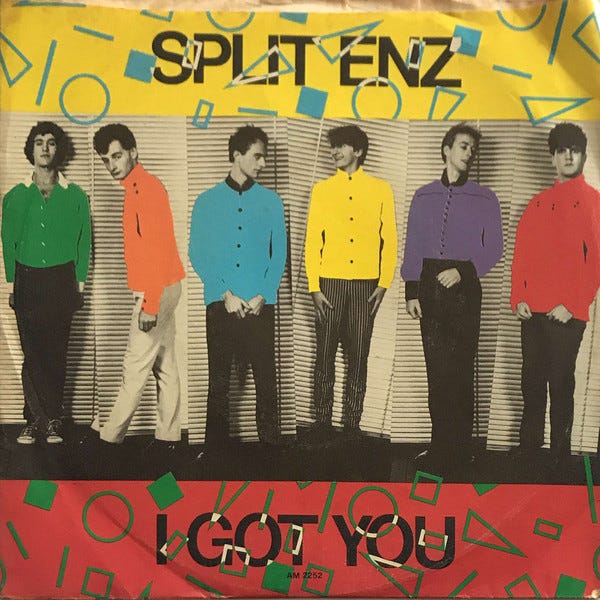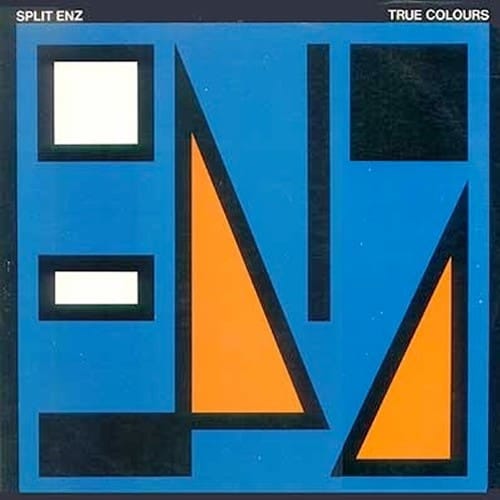"I Got You" by Split Enz
The Best Song Ever (This Week): a quick dive into a song and what makes it special.
“I don't know why sometimes I get frightened…”
Split Enz — the “nz” is for New Zealand. The band changed their name from Split Ends upon a move to Australia to try to make it big, or at least bigger. This was 1975, when no New Zealand artist had ever had a hit in the UK or US. If this band from the small island nation was going to make it Internationally, they were going to do it with their Kiwi on their sleeves.
That hit came with a single about anxiety and obsession written by bandleader Tim Finn’s kid brother Neil, from an album with a cover designed by a university chum. Their Australian label, Mushroom, didn’t hear much in it, releasing the True Colours album and “I Got You” single simultaneously in January 1980. January releases often cast records into the post-holidays lull like Spartans leaving a baby on a hillside. By March, however, both the album and single were topping the charts in Australia and New Zealand and would stick there for months. Come August, “I Got You” went to #12 in the UK; two months later, it hit #1 in Canada and skimmed the US singles charts at #53. True Colours even cracked the Top 40 album chart in the US, where copies with laser-etched vinyl were available.
“I Got You” starts off tense, just clipped guitar strumming in a stalking rhythm. Neil Finn’s vocals join a bit late and almost with a flat affect. He’s backed by a synthesizer’s eerie parabolic whirls. The beat sounds like someone impatiently drumming their fingers. It is uncomfortable, which isn’t a word you often see used to describe hit records.
The chorus is what makes most songs and especially this one. The first comes just over a half minute in. The keyboard sound brightens dramatically, emulating that garage rock staple, the Vox Continental organ, but the respite is brief. Finn sings the vocal hook just a single time before the verse reclaims the song a beat too soon. As the keys return to their creep-show oscillations, it’s clear what kind of ride we’re on — tension built for the pleasure of release.
Each verse ratchets up the tension, pairing a slightly twisted declaration of affection (“Look at you, you're a pageant / You're everything, that I've imagined”), with the second couplet’s teeter-totter dip into anxiety (“Something's wrong, I feel uneasy / You show me, tell me you're not teasin'”). The production accentuates the drop by slapping extra reverb on the last word of a line (“something’s wrong-ong-ong-ong”).
The abrupt shift into the second chorus is where the hook is set. Finn’s voice jumps higher as he repeats the sort-of rhyme, further emphasizing the breakneck climb of the melody. It’s a little wobbly up there at the top of his range, and alongside keyboards that sound like they’ve escaped from some ‘60s frat party banger, it’s both catchy and affecting -- delirious in both senses of the word.
I don't know why sometimes I get frightened
You can see my eyes, you can tell that I'm not lyin'
Lit by high-wattage power pop, the naked humanity of the chorus’s few lyrics still startles. This was particularly arresting for 1980. Overwrought obsession was supposed to be couched in pop songcraft, not amplified by it. Three years later, The Police blanketed radio and MTV with the honeyed “Every Breath You Take,” which is manifestly more oppressive, but couples swayed to it at their wedding receptions well through the ‘90s. “I Got You” doesn’t have anyone, not really.
As the last verse troops in, the cycle of tension and release begins to spin out of balance. The production on Finn’s vocals actually gets drier — no more creature-double-feature echo — as they grow more strained and urgent. The verse ends with a clenched-jaw “it gets on my nerves,” a muted cry of the insecure and self-destructive, which statistically speaking, is most of us.
A song about feeling the most and fearing the worst couldn’t really end any other way, but for all of the pure pop pleasure of that stunner chorus, repeating it and its “I don’t know why sometimes I get frightened” through the fade out feels less like a release than an unravelling.
Split Enz, well, split at the end of 1984. Neil Finn went on to form Crowded House, which brother Tim joined for a time in the ‘90s, and sold 10 million albums. His “Don’t Dream It’s Over” was an international hit the likes of which a New Zealand artist had never seen. It can fairly be described as perfect.
10 Song Playlist
Songs mentioned in, or in the neighborhood of, this post
A Very Rare Personal Note
“I Got You” changed my life. This is not an exaggeration. I first saw the video on a low-rent local music video show when any music video, or even cable TV to my family, was a novelty. My first thought is that I loved it (I didn’t know why I sometimes I got frightened, either). But my second thought was, “why haven’t I heard this before?” It’s that second thought where the life-changing comes in. Up to that point, I assumed that all good songs were on the radio, at least somewhere on the dial. This made me wonder what else I was missing, and moved from passively receiving music to actively seeking it out, which became as lifetime thing. If it hadn’t been “I Got You,” it very well could have been some other song. But it wasn’t some other song. It was “I Got You,” which is why it changed my life.
New Thing
This gorgeous video for Jose Gonzales’ single from his upcoming Local Valley (September 17) uses animation based on mathematician Jim Horton Conway’s Game of Life cellular automaton.



